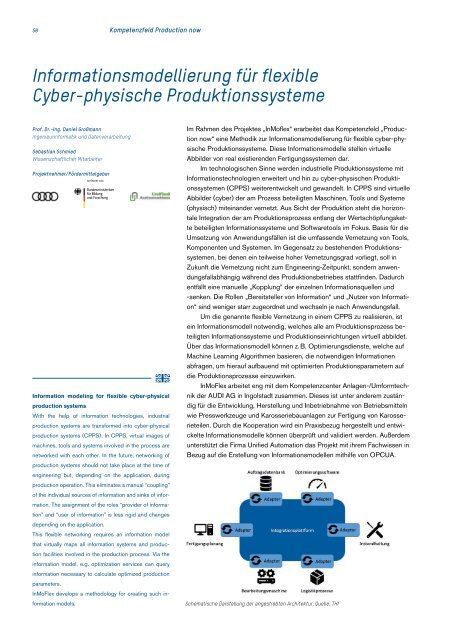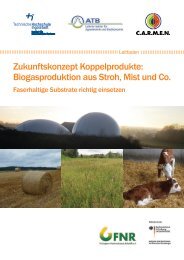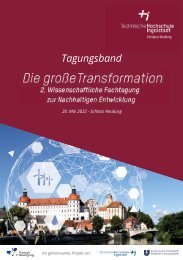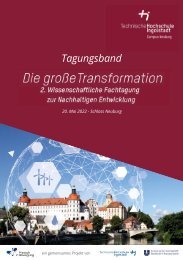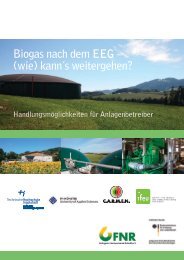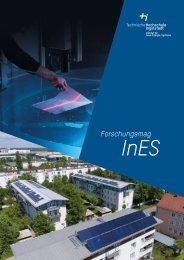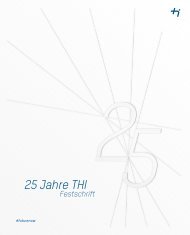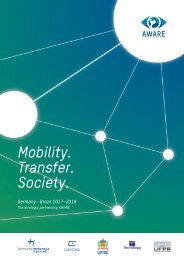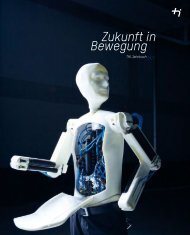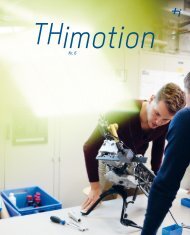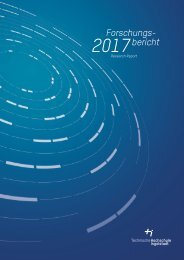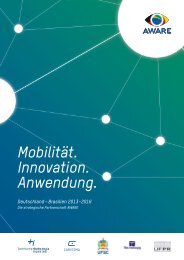Technische Hochschule Ingolstadt Forschungsbericht 2019
Erfolgreiche ePaper selbst erstellen
Machen Sie aus Ihren PDF Publikationen ein blätterbares Flipbook mit unserer einzigartigen Google optimierten e-Paper Software.
58 Kompetenzfeld Production now<br />
Informationsmodellierung für flexible<br />
Cyber-physische Produktionssysteme<br />
Prof. Dr.-Ing. Daniel Großmann<br />
Ingenieurinformatik und Datenverarbeitung<br />
Sebastian Schmied<br />
Wissenschaftlicher Mitarbeiter<br />
Projektnehmer/Fördermittelgeber<br />
Information modeling for flexible cyber-physical<br />
production systems<br />
With the help of information technologies, industrial<br />
production systems are transformed into cyber-physical<br />
production systems (CPPS). In CPPS, virtual images of<br />
machines, tools and systems involved in the process are<br />
networked with each other. In the future, networking of<br />
production systems should not take place at the time of<br />
engineering but, depending on the application, during<br />
production operation. This eliminates a manual “coupling”<br />
of the individual sources of information and sinks of information.<br />
The assignment of the roles “provider of information”<br />
and “user of information” is less rigid and changes<br />
depending on the application.<br />
This flexible networking requires an information model<br />
that virtually maps all information systems and production<br />
facilities involved in the production process. Via the<br />
information model, e.g. optimization services can query<br />
information necessary to calculate optimized production<br />
parameters.<br />
InMoFlex develops a methodology for creating such information<br />
models.<br />
Im Rahmen des Projektes „InMoflex“ erarbeitet das Kompetenzfeld „Production<br />
now“ eine Methodik zur Informationsmodellierung für flexible cyber-physische<br />
Produktionssysteme. Diese Informationsmodelle stellen virtuelle<br />
Abbilder von real existierenden Fertigungssystemen dar.<br />
Im technologischen Sinne werden industrielle Produktionssysteme mit<br />
Informationstechnologien erweitert und hin zu cyber-physischen Produktionssystemen<br />
(CPPS) weiterentwickelt und gewandelt. In CPPS sind virtuelle<br />
Abbilder (cyber) der am Prozess beteiligten Maschinen, Tools und Systeme<br />
(physisch) miteinander vernetzt. Aus Sicht der Produktion steht die horizontale<br />
Integration der am Produktionsprozess entlang der Wertschöpfungskette<br />
beteiligten Informationssysteme und Softwaretools im Fokus. Basis für die<br />
Umsetzung von Anwendungsfällen ist die umfassende Vernetzung von Tools,<br />
Komponenten und Systemen. Im Gegensatz zu bestehenden Produktionssystemen,<br />
bei denen ein teilweise hoher Vernetzungsgrad vorliegt, soll in<br />
Zukunft die Vernetzung nicht zum Engineering-Zeitpunkt, sondern anwendungsfallabhängig<br />
während des Produktionsbetriebes stattfinden. Dadurch<br />
entfällt eine manuelle „Kopplung“ der einzelnen Informationsquellen und<br />
-senken. Die Rollen „Bereitsteller von Information“ und „Nutzer von Information“<br />
sind weniger starr zugeordnet und wechseln je nach Anwendungsfall.<br />
Um die genannte flexible Vernetzung in einem CPPS zu realisieren, ist<br />
ein Informationsmodell notwendig, welches alle am Produktionsprozess beteiligten<br />
Informationssysteme und Produktionseinrichtungen virtuell abbildet.<br />
Über das Informationsmodell können z. B. Optimierungsdienste, welche auf<br />
Machine Learning Algorithmen basieren, die notwendigen Informationen<br />
abfragen, um hierauf aufbauend mit optimierten Produktionsparametern auf<br />
die Produktionsprozesse einzuwirken.<br />
InMoFlex arbeitet eng mit dem Kompetenzcenter Anlagen-/Umformtechnik<br />
der AUDI AG in <strong>Ingolstadt</strong> zusammen. Dieses ist unter anderem zuständig<br />
für die Entwicklung, Herstellung und Inbetriebnahme von Betriebsmitteln<br />
wie Presswerkzeuge und Karosseriebauanlagen zur Fertigung von Karosserieteilen.<br />
Durch die Kooperation wird ein Praxisbezug hergestellt und entwickelte<br />
Informationsmodelle können überprüft und validiert werden. Außerdem<br />
unterstützt die Firma Unified Automation das Projekt mit ihrem Fachwissen in<br />
Bezug auf die Erstellung von Informationsmodellen mithilfe von OPCUA.<br />
Schematische Darstellung der angestrebten Architektur. Quelle: THI


